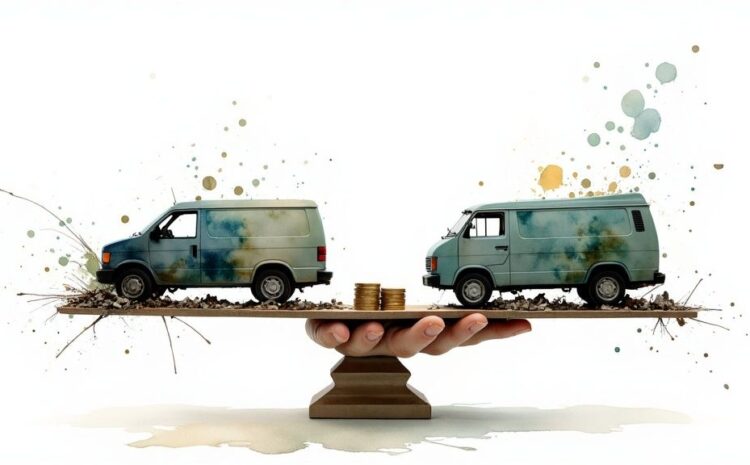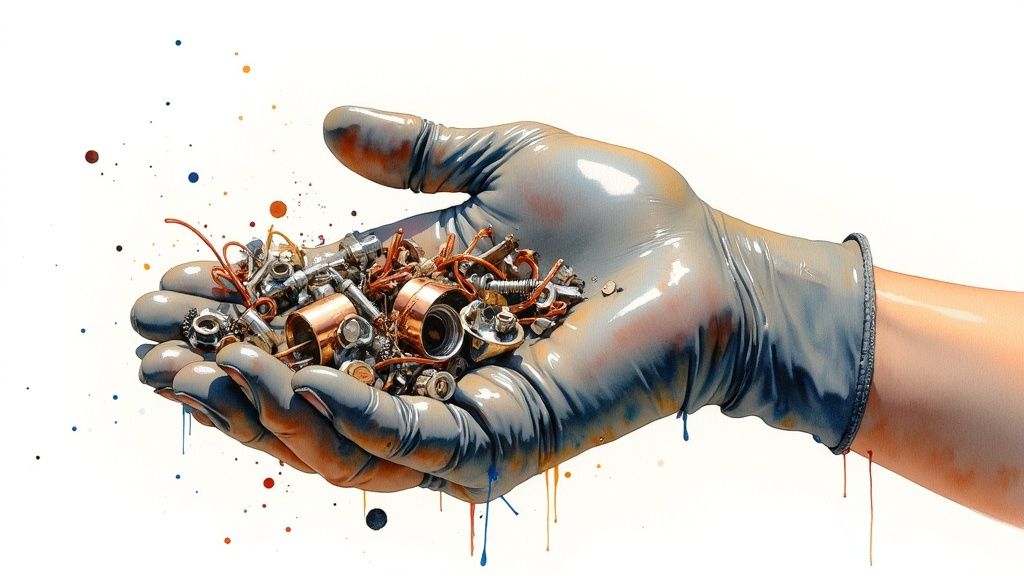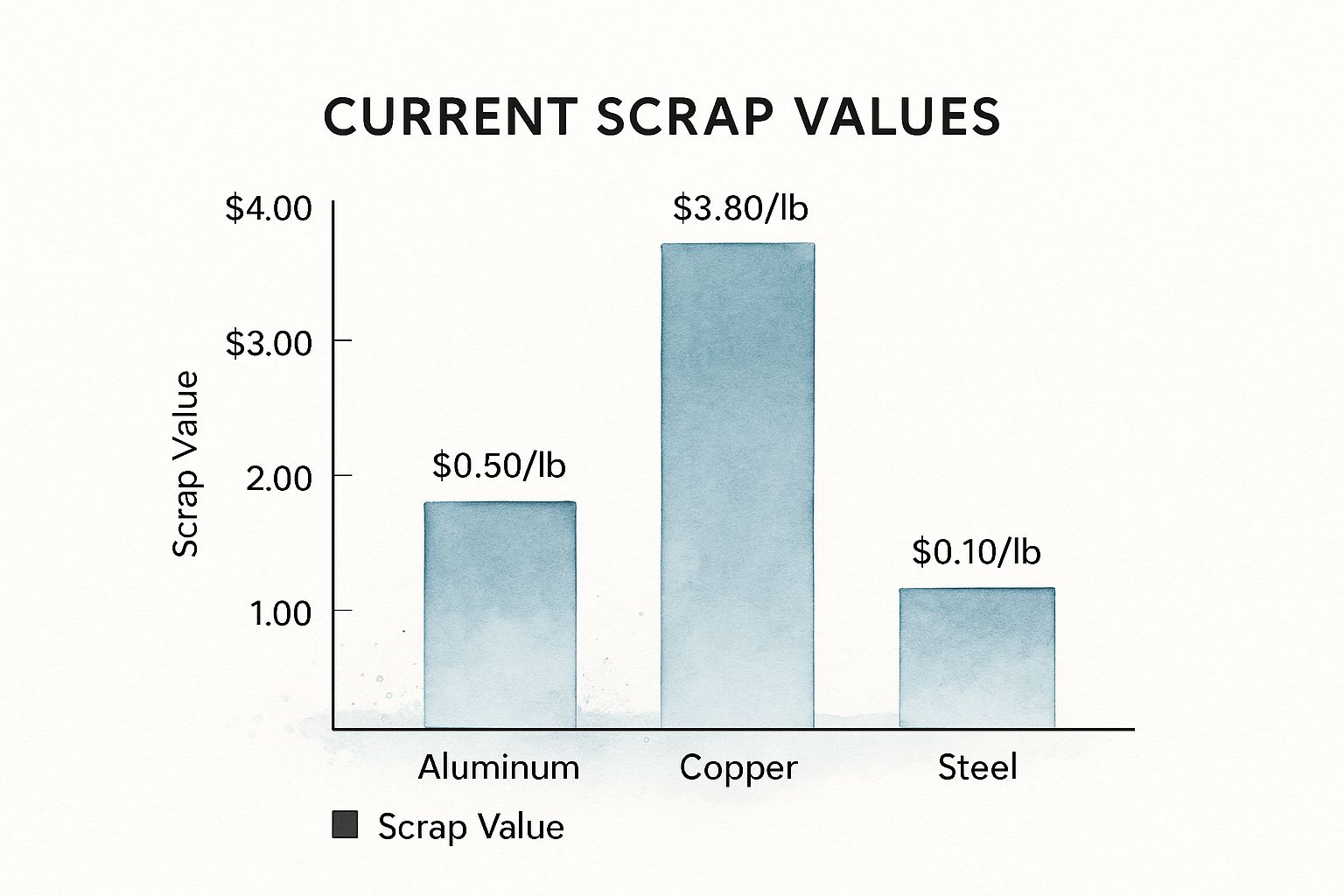
Understanding Current Scrap Values for Cars and Vans
When you scrap your car, you're not just getting rid of an old vehicle; you're essentially selling it for its weight in raw materials. The current scrap values aren't just numbers plucked from thin air – they’re directly linked to the global price of metal and the sheer tonnage of your car.
What Actually Determines Your Scrap Car's Value?

It’s a common mistake to think a scrap quote has anything to do with the car's original price tag, its age, or how well it once ran. Once a car is destined for the scrap heap, its value completely transforms. It's no longer a mode of transport; it’s a collection of commodities waiting to be recycled.
Your old Ford Fiesta becomes a bundle of steel, aluminium, and copper.
By far the biggest factor influencing the price you’ll get is its weight. A heavier car simply has more metal, which is the whole point of the scrapping process. This is precisely why a hefty transit van or a big estate car will always fetch a better price than a little hatchback.
Think of it like selling potatoes at a market – the final price comes down to how much it weighs.
The Ever-Changing Commodity Markets
The scrap metal trade is completely plugged into the global commodity markets. The prices for steel, copper, and aluminium are in constant motion, shifting daily based on worldwide supply and demand. This means the quote you get for your car this week could be noticeably different next week.
A scrap car’s value is a dynamic figure tied to tangible, real-world economic forces, not just a scrap yard's opinion. Your vehicle’s weight is the anchor, but market fluctuations cause the final price to rise and fall.
These market shifts are happening all the time. A construction boom in Asia could drive up steel demand, giving your quote a little boost right here in London. On the other hand, a global manufacturing slowdown could pull prices down. This is the reality of why current scrap values never stand still.
For a deeper dive into what your specific vehicle might be worth, check out our detailed guide on how much scrappage your car is worth.
Key Factors That Define Your Scrap Quote
To help break it down, here’s a quick look at the main elements that go into calculating the final price for your vehicle.
| Influencing Factor | Impact on Value | Real-World Example |
|---|---|---|
| Total Kerb Weight | High – This is the primary driver of the base price. | A 2-tonne Land Rover will be worth significantly more than a 1-tonne Fiat 500. |
| Metal Composition | Medium – More valuable metals like aluminium or copper add value. | A car with an aluminium engine block and alloy wheels is worth more than one with a cast iron block and steel wheels. |
| Current Market Rates | High – Daily fluctuations in metal prices directly impact the final offer. | A surge in global steel demand can increase your quote overnight, even if the car itself hasn't changed. |
| Missing Parts | Medium – Removing major components reduces the vehicle's total weight. | Scrapping a car without its engine or catalytic converter will lead to a much lower offer. |
Ultimately, understanding these factors helps clear up the mystery behind the quote. It’s not just a random figure; it’s a straightforward calculation based on what your car is made of and what those materials are worth today.
How Global Markets Influence Local Scrap Prices

Ever wondered why the quote for your scrap car can fluctuate so much, sometimes week by week? The answer isn't found in your local London or Surrey scrap yard. It’s actually tied to a massive, interconnected global marketplace that stretches across continents.
It helps to think of the scrap metal market a bit like the stock market. Just as share prices rise and fall with economic news, the current scrap values for steel, aluminium, and copper shift every single day based on what’s happening with worldwide supply and demand.
A construction boom on the other side of the planet can suddenly drive up the demand for steel. That surge sends a ripple effect all the way back to the UK, and just like that, your old car is worth a bit more. On the flip side, a slowdown in global manufacturing can cause prices to dip just as quickly.
The Ripple Effect of International Trade
It’s not just about supply and demand, either. Global economic policies and trade agreements play a huge part in what your car is worth. When countries start putting up tariffs or changing their import rules, it creates waves that we feel right here at home. These aren't just abstract economic theories; they directly affect the cash you get for your vehicle.
For example, we saw this happen in early 2025 when UK scrap prices took a noticeable hit. Prices fell by around £10 per tonne, dropping to their lowest point in over two years. A big reason for this was the U.S. bringing in new import tariffs on scrap metals and car parts. That move slashed their demand for UK exports, creating a surplus of scrap in our own market. You can read a bit more about why scrap prices dropped during that period.
It’s a perfect illustration of how a policy decision made thousands of miles away can directly change the quote you get from a local company like Fast Scrap Car.
Key Global Factors at Play
Several big-picture forces are constantly shaping the scrap metal world. Getting your head around them helps explain why the prices seem to change on a whim.
- Global Construction Demand: When major economies are busy building new infrastructure, skyscrapers, and bridges, they need a colossal amount of steel. That demand pushes prices up for everyone.
- Automotive Manufacturing Output: The global car industry is one of the biggest buyers of recycled steel and aluminium. When factories are churning out new cars, they need more scrap metal to do it.
- Currency Exchange Rates: The value of the pound against other major currencies, especially the U.S. Dollar, impacts how much it costs to export scrap. This, in turn, influences the prices paid here in the UK.
- Energy Costs: It takes a massive amount of energy to melt and process scrap metal. When energy bills go up for the recycling plants, it can sometimes suppress the price they’re willing to pay for raw scrap.
The price you’re offered for your vehicle isn’t just a local valuation. It's a reflection of global economic health, international trade relationships, and the worldwide appetite for raw materials.
At the end of the day, your local scrap yard doesn’t just pluck a price out of thin air. They are reacting to the very same international market forces that affect giant corporations and entire industries. This is why current scrap values are always shifting, making it crucial to get a quote that reflects today’s live rates.
Uncovering the Valuable Metals Inside Your Vehicle
Your old car might seem like a single piece of junk sitting on the drive, but it's really a treasure trove of valuable, recyclable metals. To get a proper grip on current scrap values, you need to stop seeing it as just a car and start seeing it for what it is: a collection of commodities. Steel makes up most of the weight, sure, but there are some hidden gems in there that really bump up the price.
Take the wiring loom, for example – that complex web of cables running through the entire car is packed with high-value copper. Then you've got the engine block, wheels, and radiator, which are often made from lightweight but valuable aluminium. Even the humble car battery has a good bit of lead in it. Each of these metals has its own fluctuating market price, and they all add up to form your final quote.
This is precisely why bigger, heavier vehicles nearly always fetch a higher price. A large van or a hefty estate car isn't just carrying more steel; it has more of everything. More copper wire, a bigger aluminium engine, and chunkier components all contribute to a better final payout.
The Breakdown of Metal Values
Understanding that not all metals are created equal is key. Steel gives you the weight, but it’s the copper and aluminium that often bring in the better money. It's this specific mix of materials that makes an accurate, honest valuation so vital.
This image gives you a great visual snapshot of just how different the prices can be for these core metals.

As you can see, copper is in a completely different league to aluminium or steel, which really hammers home why it's such a crucial part of the overall valuation.
To give you a clearer picture, let's break down where you'll find these metals and what they're currently worth.
A Look at the Metal Value in a Typical Car
| Metal Type | Common Location in Vehicle | Approximate Value per kg |
|---|---|---|
| Copper | Wiring loom, starter motor, alternator, radiator core | ~£5.40 |
| Aluminium | Engine block, cylinder heads, wheels, radiator, transmission | ~£0.50 |
| Steel | Chassis, body panels, doors, roof | ~£0.15 |
| Lead | Car battery | ~£0.80 |
Note: Prices are approximate and fluctuate with market conditions.
This table shows why we look at the whole picture – while steel forms the bulk, the value is often hidden in the smaller, more precious components.
A Look at UK Metal Prices
The UK scrap metal market is always on the move, with prices changing based on the type and grade of the material. As of April 2025, there's a clear hierarchy. Top-grade metals like dry bright copper (that's clean, stripped-down cable) can bring in around £5.40 per kilogram, while standard mixed aluminium is closer to £0.50 per kg. You can learn more about the latest scrap metal prices in 2025 to get a feel for how different materials stack up.
By viewing your car not as a single useless item but as a bundle of valuable commodities, you begin to see its true potential. Every component, from the engine to the wiring, has an intrinsic monetary worth waiting to be recovered.
This shift in perspective is crucial. It’s why a car that's had its catalytic converter or engine removed will get a lower quote – the most valuable parts are missing. On the other hand, a complete vehicle with everything intact means you get the maximum return based on its full weight and material make-up. At Fast Scrap Car, we assess the entire vehicle to give you a fair price based on its total commodity value.
Why Steel Prices Drive Overall Scrap Car Value

Your car might be a complex machine full of different materials, but when it comes to scrap value, one metal overwhelmingly dictates the price: steel.
Think of it like this: your car's value is a recipe, and steel is the main ingredient. If the price of flour shoots up, the loaf of bread on the shelf costs more. It's the same principle here. When global steel prices shift, the current scrap values for cars in London and Surrey will almost always follow.
Why is steel so important? Well, the average car is made up of about 55% steel. That’s everything from the core chassis and frame right through to the doors and body panels. With so much of the vehicle's weight coming from this one metal, even a small wobble in the steel market can create a big ripple in the quote you get.
This direct link is why it pays to have a basic grasp of what’s happening with steel prices. It’s the single biggest factor behind the number you’ll be offered.
The Volatile Steel Market and Your Quote
The price of steel is never static; it’s constantly on the move. We’ve seen some pretty dramatic peaks and valleys in recent years, and scrap payouts have mirrored them perfectly. The year 2025 was a textbook example, with UK steel scrap prices bouncing all over the place.
For a bit of context, prices soared to an all-time high of 377 USD per tonne back in March 2025, driven by huge global demand. Fast forward to early September, and they’d cooled off to 345 USD per tonne. These aren't just abstract numbers; these swings directly impact how much UK steel producers can afford to pay for scrap, especially when they’re already battling some of the highest energy costs in Europe. If you're curious, you can dig deeper into these commodity price shifts and see the trends for yourself.
The quote you receive for your scrap car isn't just some number plucked out of thin air by a local dealer. It’s a direct reflection of global steel demand, international energy costs, and trade dynamics, all boiled down into a single price.
Why High Energy Costs Matter
The connection between energy bills and scrap prices adds another fascinating layer to the valuation. It’s been widely reported that UK steelmakers pay as much as 50% more for their electricity than their German and French competitors.
Here’s a simple breakdown of how that hits your pocket:
- Higher Production Costs: When a steel mill’s energy bills are sky-high, it costs them more to melt down and process your old car into recycled steel.
- Lower Offers for Scrap: To stay profitable, these mills have two choices: either buy less scrap or pay less for it. Often, they do a bit of both.
- The Knock-On Effect: That financial pressure works its way down the supply chain, right to the local scrap dealers in Surrey and London. They have to adjust the prices they offer you to match what the mills are willing to pay them.
So, when you think about it, the journey your car takes from a driveway in Guildford to a roaring furnace in a steel mill is shaped by these massive economic forces. Realising that steel is the heavyweight champion of your car's value helps make sense of the whole process. It explains exactly why current scrap values can change from one week to the next.
What About Your Specific Car or Van? How Its Details Affect Your Quote
While those big global markets set the general price for scrap metal, the specific details of your own car or van are what really shape the final quote you’ll get. Think of the market price as the starting point. From there, your vehicle’s unique features will nudge that price up or down. The most significant factor? Its sheer size and weight.
It really is that simple: more metal means more money. A hefty Ford Transit van or a Land Rover Discovery is packed with far more steel, aluminium, and copper than a little Vauxhall Corsa. That's why a bigger vehicle will always fetch a higher scrap price, no matter what it cost brand new or the badge on the front.
Does the Make and Model Matter?
Yes, but probably not for the reason you think. The make and model of your vehicle is essentially a quick cheat sheet for its size, weight, and the materials it's built from. An experienced scrap dealer knows that a BMW 5 Series is heavier and likely has more valuable components—like an aluminium engine block—than a Fiat 500.
This knowledge just helps them give you a more accurate quote right from the start. It’s not about the brand prestige; it’s about what that brand represents in terms of raw, recyclable materials. The make and model are just shorthand for the vehicle's weight and metal content, which is where the real value lies.
Your vehicle's identity—its make, model, and year—is simply a blueprint for its material worth. The real value lies in its weight and the specific metals used in its construction, not its history on the road.
Why Missing Parts Mean a Lower Price
It stands to reason that if you’re offered a price for a whole car, that price will drop if parts are missing. The quote you receive is based on the assumption that the vehicle is complete. If you’ve already stripped out some key components to sell on your own, the scrap dealer has to adjust their offer to reflect what’s left.
Here are the parts that will cause the biggest deductions:
- Engine and Gearbox: These are two of the heaviest and most metal-rich parts of any car. Pulling them out will drastically reduce the vehicle's weight and, consequently, its scrap value.
- Catalytic Converter: This is a big one. Catalytic converters contain small amounts of precious metals like platinum and rhodium, making them one of the most valuable individual components. If yours is gone, expect a significant drop in your quote.
- Alloy Wheels: A full set of alloy wheels adds a decent amount of valuable aluminium to the scales. If you swap them for basic steel wheels before sending the car off, the price will dip slightly.
Knowing this puts you in a much better position to understand the quote you're given. For a deeper dive, check out our guide on how to scrap your car for the best value. At the end of the day, presenting a complete vehicle is the surest way to get the maximum payout based on its total weight and material value.
Common Questions About Scrap Car Values
Even with a good grasp of the market forces and what makes one car more valuable than another, you’ve probably still got a few practical questions knocking around. Getting straight answers is key to feeling confident about the whole process, so let's tackle some of the most common queries we get about current scrap values in London and Surrey.
This is where we clear up any last-minute uncertainties. We’ll get right to the point on the questions that really matter when it's time for collection, making sure there are no surprises on the day.
How Often Do Scrap Car Prices Change?
Scrap car prices are never set in stone; they’re always on the move. It helps to think of them less like a price tag on a shelf and more like the price of petrol at the pump—they can, and often do, change daily.
Why? Because the value is tied directly to the global commodity markets for metals like steel, aluminium, and copper. These markets bounce around every single day based on global supply and demand, industrial production, and even international politics. A major event on the other side of the world can easily cause a ripple effect that changes UK prices overnight. This is exactly why a quote you got last month might be different from one you get today.
Does a Running Car Get a Better Scrap Price?
This is a great question, and one we hear all the time. But the simple answer is, generally, no. When a vehicle is being sold for scrap, its value comes from its weight in recyclable metal, not whether the engine still turns over. A car that starts first time is weighed on the exact same scales as one that hasn't moved for ten years.
The scrap yard is focused on recovering and recycling raw materials. Whether the engine is in working order is completely irrelevant to that process.
The only exception is when a car might be considered for salvage, meaning it has valuable parts that can be resold. But for a true end-of-life vehicle destined for the crusher, its ability to run doesn't add to its metal-based value.
The main thing to remember is that the car's completeness is what counts. A running car with its engine missing would be worth far less than a non-runner that's fully intact.
Is My Initial Quote Guaranteed Until Collection?
This is a really important point. When you get a quote from a reputable company like Fast Scrap Car, we lock that price in for a set period, usually about seven days. This is our way of protecting you from any sudden market drops that might happen between you accepting the offer and us coming to collect the car.
The guarantee, however, assumes the vehicle is as you described it. If our driver arrives to find that major parts like the engine, catalytic converter, or all the wheels are gone, the quote will have to be adjusted. The price we guarantee is for the complete car you told us about.
What Paperwork Is Essential for Scrapping a Car?
Getting the paperwork right isn't just a good idea—it's a legal must that protects you. In the UK, the one document you absolutely need is the V5C logbook (often called the registration document). This is your proof that you're the registered keeper and have the right to scrap the vehicle.
Here’s the simple process:
- Hand over the V5C: The driver who collects your car will need the main part of the logbook.
- Keep the yellow slip: You need to tear off the yellow slip (that’s section 9 on older logbooks or section 4 on newer ones) and keep it for your own records.
- Tell the DVLA: It’s your legal duty to inform the DVLA right away that you’ve sold your vehicle to the motor trade. This is what officially takes you off the hook for any future responsibility for the car.
Once your vehicle is scrapped at an Authorised Treatment Facility (ATF), you’ll also receive a Certificate of Destruction (CoD) as the final proof. If you want to dig deeper into any of these points, you can find more answers on our comprehensive FAQ page. Sorting the paperwork properly means the whole experience is smooth and totally hassle-free.
Ready to see what your vehicle is worth today? Get a free, no-obligation quote from Fast Scrap Car in under a minute. We offer guaranteed prices, free same-day collection across London and Surrey, and instant payment. Visit us at https://fastscrapcar.co.uk to get started.
